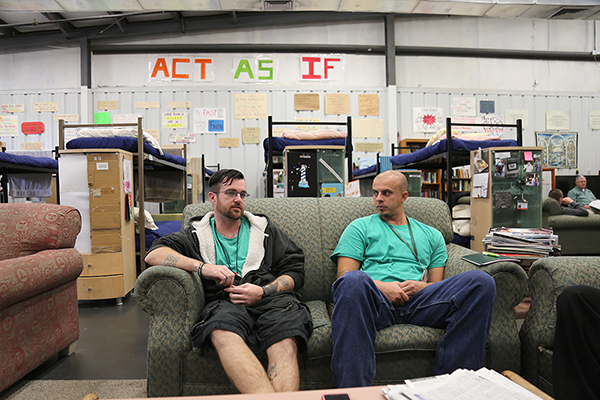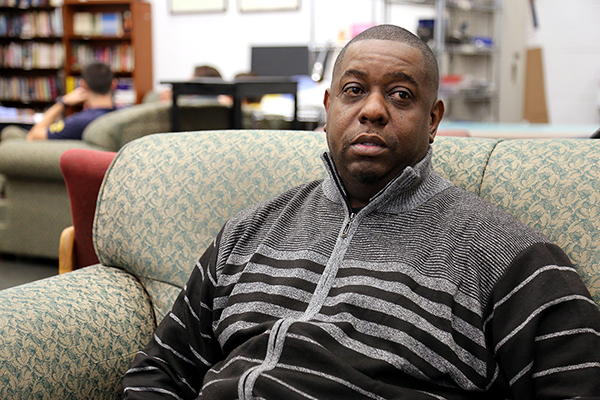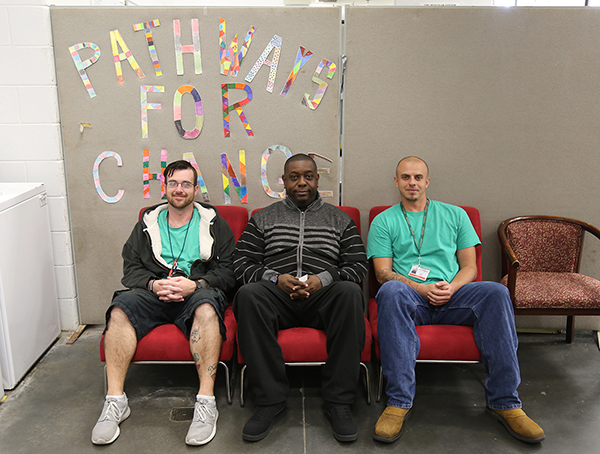
Search by Keyword
Search by Department
All Departments Administration Corrections Development Services Facilities Management Human Resources Information Technology Library Services Management and Budget Services Natural Resources Management Neighborhood and Human Services Parks and Recreation Public Safety Public Works Veterans Services Waste ServicesServing in Afghanistan left 29-year-old Army veteran Derick Zemke with a knee injury that would impact his life more than he could imagine.
Somewhere between surgeries and the pain that came with his injury, Zemke’s use of prescription pain medicine turned to abuse, escalating to dealing opioids and eventually using street drugs to sustain his habit.
But after three and a half years in and out of jail, Zemke was ready to turn his life around. A fellow inmate told him about the Pathways for Change addictions treatment program, and he decided to go for it. Escambia County provides financial support to the program, which is housed at the Escambia County Work Release Center on West Fairfield Drive.
“I was a productive member of society before,” Zemke said. “I played high school football, baseball, basketball, made great grades, was in the Army. And I wanted to get back to what I used to be before the pain medicine.”
The Men’s Residential Treatment at Pathways for Change is an alternative sentencing option for non-violent criminal offenders who want to overcome destructive behaviors, attitudes and habits that prevent them from living a life free from crime and incarceration.
This year, Escambia County provided $175,000 to Pathways for Change, and an additional $168,750 was allocated to the county's probation fund to house program participants. Historically, the county has provided $140,000 directly to Pathways for Change each year in addition to the $168,750 for housing.
Zemke started Pathways for Change in July 2017 and is set to graduate in January 2019, with plans to go to college in May to study hospitality and eventually work in the tourism industry.
Along with his physical injuries, Zemke has battled post-traumatic stress disorder since his time in Afghanistan, and his automatic response was to self-medicate and keep his feelings inside. But in Pathways for Change, he gave counseling a try, started working through a PTSD workbook and opened up about his struggles.
Zemke said his hope is that after he graduates, he can help other veterans who are facing challenges similar to his own.
“It’s hard to go talk to a doctor that’s never experienced the things that you’ve experienced and be open with them about it,” Zemke said. “But talking to another veteran, I feel that I can talk to somebody and I’ve been in the same exact place as them – using opioids, battling PTSD, feeling like an outcast or a black sheep. And if I can relate on that level with them, they’re more likely to open up and try to change…so that inspires me to keep doing this, and hopefully I can save more lives than just my own.”
Army veteran Allen Townsend, 29, agreed that being able to openly talk with others is a significant benefit to being in the program. Townsend began drinking heavily after his first deployment to Iraq, eventually moving on to meth and dealing drugs.
After a two-month crime spree with his wife that left him charged with 28 felonies, he was ready to serve his 10-year minimum rather than enter Pathways for Change. His wife and oldest daughter convinced him otherwise, and he decided to give the program a chance.
“Without this program, I would definitely be out using again,” Townsend said. “I have learned to trust other people, other men, which is something I haven’t done since the Army. It’s a great support group – guys I can talk to, and they’re honest to me.”
Townsend will graduate in October of this year, with plans to complete an IT training program and move to Colorado to start fresh. With his wife still battling a drug addiction, Townsend is estranged from his family. He said Pathways for Change has become his family.
“These guys want me to succeed as much as I want them to succeed,” Townsend said. “I could have known these guys my whole life from what we’ve been through together.”
Navy veteran McArthur Franklin, 44, is nearing the end of his time in Pathways for Change, with his graduation set for April. After an injury forced him to leave the military, he fell into drug and alcohol addiction and suffered from PTSD.
Franklin said the program is not for the faint of heart, but the challenge is worth it.
The four-phase, 18-month program includes basic living and communication courses, group therapy, individual therapy and community service, with the final phase of the program allowing participants to live outside of the center and report back for periodic drug screenings.
“There’s a lot of rules here that you’ve got to follow, and if you don’t really want to be here, you’re not going to do it,” Franklin said.
Pathways for Change also connected Franklin with veteran-specific services like Volunteers of America, which helped him get an apartment of his own. Franklin is enrolled in barber school at Pensacola State College and plans open his own barber shop after he graduates.
“They’re teaching us that it’s a better way of life to focus on goals and actually try to complete them,” he said. “They’re pretty much dedicated to helping us, the people here actually are genuine and they show that they care.”
Lt. Anita Hemphill, the first lieutenant over security at the Escambia County Work Release Center, said the county supports programs like Pathways for Change that offer alternatives to incarceration.
“Pathways for Change is a solidified program that helps with recidivism,” Hemphill said. “It’s a very disciplined program – I think it has to be disciplined for someone to be put to the test and see if they’re really ready to make that lifestyle change and become productive citizens in the community.”
Escambia County Corrections Director Tammy Jarvis also emphasized the importance of alternatives to incarceration, which she said are an excellent way to assist nonviolent offenders in dealing with mental health, anger management and addiction issues.
"Incarceration alternatives help offenders transition from the lifestyle that got them into jail to having stable employment, becoming self-sufficient and maintaining a crime-free life," Jarvis said.
Each crime avoided also benefits the community in reduced victimization and reduced costs, Jarvis said, since criminal justice costs are driven by volume of activity.
"Reducing recidivism can help reduce overall volume of activity, which in turn results in long-term savings," Jarvis said. "Programs such as this provide a long-term investment in our community by providing those served with the support they need to restructure their lives and achieve success."

Allen Townsend, left, and Derick Zemke at the Pathways for Change Men's Residential Treatment at the Escambia County Work Release Center on West Fairfield Drive.

McArthur Franklin speaks about his experience at Pathways for Change.

Allen Townsend, left, McArthur Franklin and Derick Zemke at the Pathways for Change Men's Residential Treatment at the Escambia County Work Release Center on West Fairfield Drive.

The mission of Escambia County government is to provide efficient, responsive services that enhance our quality of life, meet common needs and promote a safe and healthy community.
Under Florida law, IP addresses and both the content of emails and email addresses are public records. If you do not want your IP address and the content of your email or your email address released in response to a public records request, do not send electronic mail to this entity. Instead, contact this office by phone or in person.

